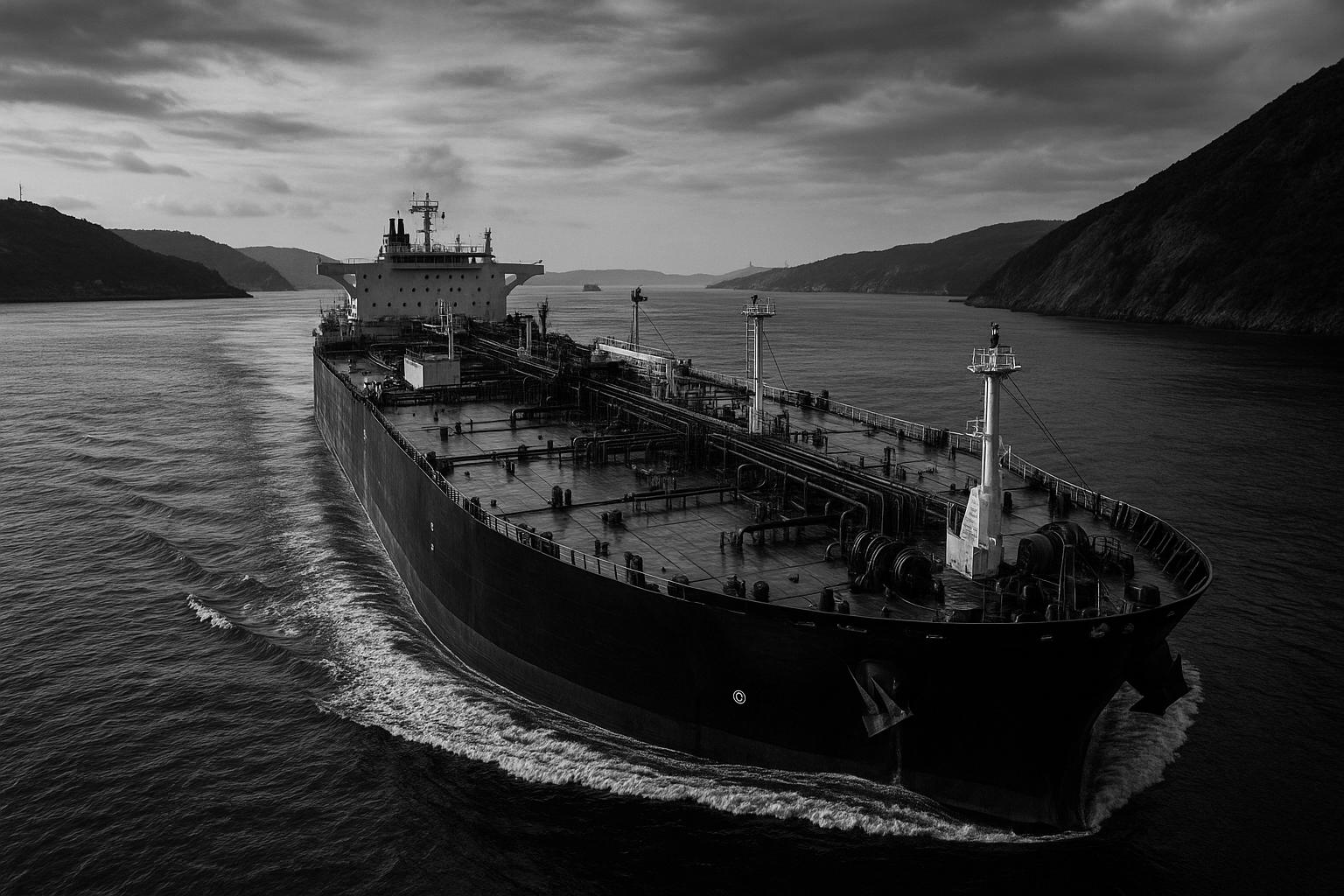A symbolic parliamentary vote by Iran to close the Strait of Hormuz has sent shockwaves through UK and Welsh energy markets, fuelling fears of soaring oil prices, disrupted LNG supplies, and intensified cost-of-living pressures amid geopolitical tensions.
The recent symbolic parliamentary vote in Iran supporting the closure of the Strait of Hormuz has triggered significant alarm across the UK and Wales, raising fears of a potential energy crisis and broader economic fallout. The Strait of Hormuz is a crucial maritime chokepoint through which approximately 20% of the world’s oil and liquefied natural gas (LNG) transits. Any disruption to this passage could severely affect global energy markets and domestic supplies, particularly for the UK, which relies heavily on LNG imported via Milford Haven from Qatar, almost all of which passes through Hormuz.
The immediate market reaction to Iran’s move—and the backdrop of escalating tensions following recent U.S. airstrikes on Iranian nuclear facilities—has been sharp and dramatic. Brent crude oil prices surged by as much as $3 to $5 per barrel immediately after the announcement, with some analysts warning of potential spikes climbing to $130 per barrel if the disruption is prolonged. Oil markets worldwide are already responding to heightened geopolitical risk, with prices having risen around 10% since the initial escalation, and Brent crude settling near $79 per barrel. These increases have contributed to broader market unease, evident in a slight dip in Asian stock markets as investors brace for instability.
Shell’s CEO Wael Sawan captured the gravity of the situation by describing the Strait of Hormuz as “the artery through which the world’s energy flows,” highlighting the potential for severe impact on global trade if the strait were blocked. Major energy companies are reportedly undertaking contingency planning, exploring alternative supply routes and measures to mitigate disruptions.
For Wales, the stakes are notably high. The region’s reliance on LNG imports routed through Milford Haven places it at direct risk of supply delays and resulting price rises, which could exacerbate the already intense cost-of-living pressures facing households. Local gas prices could spike as operators seek more expensive LNG sources from markets such as the U.S. or West Africa. Furthermore, manufacturing sectors across Wales and the wider UK could face rising operational costs, potentially leading to reduced competitiveness, slower economic growth, and employment challenges. The timing is particularly sensitive given ongoing economic vulnerabilities.
In response to the unfolding situation, the UK government has announced it is urgently reviewing contingency plans. These include boosting gas reserves, securing alternative LNG import arrangements, and accelerating support packages targeted at consumers struggling with rising energy bills. A spokesperson from the Department for Energy Security emphasised that the UK is engaged with international partners to safeguard energy supplies and remains committed to reducing dependency on volatile overseas markets by diversifying energy sources.
Nevertheless, some analysts caution that Iran’s parliamentary vote may be more symbolic than an immediate actionable threat, pointing out that the legislature lacks the authority to enact a formal closure of the strait. Historical precedents suggest that while disruptions in the Strait of Hormuz typically provoke short-term spikes in oil prices, any physical blockage tends to be brief, with markets eventually stabilising. This nuance tempers, to some extent, the alarm but does not diminish the urgency of the current situation.
The Bank of England has also weighed in, choosing to hold interest rates steady at 4.25% amid the unpredictable global environment. Governor Andrew Bailey noted the significant role rising energy prices, driven by Middle Eastern conflict escalation, are playing in economic uncertainty.
Experts highlight this episode as a vivid reminder of the UK’s and Wales’ vulnerability to external geopolitical shocks. Dr Emily Richards, senior economist at Cardiff University, urged a strategic response focused on enhancing domestic energy infrastructure and investing more heavily in renewable energy sources. Strengthening energy resilience, she argued, is critical to insulating the economy from future shocks and ensuring long-term stability.
In sum, while immediate physical disruption to the Strait of Hormuz might not be guaranteed, the symbolic vote and the escalating military tensions around Iran’s nuclear facilities already have profound implications. With LNG supply chains under threat and global oil prices volatile, UK and Welsh energy security hangs in a delicate balance, underscoring the need for urgent, comprehensive measures to mitigate risk and protect consumers and businesses alike.
 Reference Map:
Reference Map:
- Paragraph 1 – [1], [4]
- Paragraph 2 – [1], [2], [3], [5], [7], [6]
- Paragraph 3 – [1], [3], [4]
- Paragraph 4 – [1], [3], [6]
- Paragraph 5 – [1]
- Paragraph 6 – [1], [4]
- Paragraph 7 – [1]
- Paragraph 8 – [1]
- Paragraph 9 – [1], [2], [4]
Source: Noah Wire Services
- https://herald.wales/national-news/uk-and-wales-brace-for-energy-crisis-as-iran-threatens-hormuz-blockade/ – Please view link – unable to able to access data
- https://www.reuters.com/markets/commodities/iran-oil-doomsday-hormuz-may-be-more-fear-than-reality-bousso-2025-06-22/ – Following U.S. airstrikes on Iranian nuclear facilities, fears of a major disruption to global oil flows through the Strait of Hormuz—through which 20% of global oil passes—have surged, driving Brent crude oil prices up 10% to over $77 per barrel. However, history suggests any disruption would likely be short-lived. ([reuters.com](https://www.reuters.com/markets/commodities/iran-oil-doomsday-hormuz-may-be-more-fear-than-reality-bousso-2025-06-22/?utm_source=openai))
- https://apnews.com/article/2d05b0a9e52320e822b649b8e29d28aa – Global markets are reacting to a recent U.S. strike on Iranian nuclear and military sites, escalating ongoing tensions between Iran and Israel. In response, Brent crude oil prices rose 2.6% to $79 per barrel, and U.S. crude also increased 2.6% to $75.76 per barrel. ([apnews.com](https://apnews.com/article/2d05b0a9e52320e822b649b8e29d28aa?utm_source=openai))
- https://www.axios.com/2025/06/22/iran-closure-strait-of-hormuz – Iran’s parliament has expressed support for potentially closing the Strait of Hormuz, a critical passage for global oil shipments, in response to recent U.S. military strikes on Iran’s nuclear facilities. While the parliament’s endorsement signals a strong reaction, analysts argue the threat may be symbolic, as the legislative body lacks the authority to enact such a move. ([axios.com](https://www.axios.com/2025/06/22/iran-closure-strait-of-hormuz?utm_source=openai))
- https://www.ft.com/content/67430fac-2d47-4b3b-9928-920ec640638a – Oil prices surged following a US airstrike on Iran’s nuclear facilities, marking a significant escalation in Middle Eastern tensions. Brent crude rose as much as 5.7%, settling at $79 per barrel, while West Texas Intermediate climbed to $76.83. ([ft.com](https://www.ft.com/content/67430fac-2d47-4b3b-9928-920ec640638a?utm_source=openai))
- https://www.reuters.com/world/china/global-markets-wrapup-1-2025-06-22/ – Asian shares dipped slightly while oil prices surged to five-month highs as global markets braced for Iran’s potential retaliation following U.S. attacks on its nuclear facilities. ([reuters.com](https://www.reuters.com/world/china/global-markets-wrapup-1-2025-06-22/?utm_source=openai))
- https://www.reuters.com/business/energy/oil-open-higher-us-strikes-iran-boost-supply-risk-premium-2025-06-22/ – Oil prices are expected to rise by $3 to $5 per barrel when trading resumes, following U.S. airstrikes on Iranian nuclear sites over the weekend. ([reuters.com](https://www.reuters.com/business/energy/oil-open-higher-us-strikes-iran-boost-supply-risk-premium-2025-06-22/?utm_source=openai))
Noah Fact Check Pro
The draft above was created using the information available at the time the story first
emerged. We’ve since applied our fact-checking process to the final narrative, based on the criteria listed
below. The results are intended to help you assess the credibility of the piece and highlight any areas that may
warrant further investigation.
Freshness check
Score:
8
Notes:
The narrative is current, with the earliest known publication date of June 22, 2025. The report cites recent events, including U.S. airstrikes on Iranian nuclear facilities and Iran’s parliamentary vote to close the Strait of Hormuz. The inclusion of updated data, such as Shell CEO Wael Sawan’s statement, suggests a higher freshness score. However, the report references earlier events, indicating some recycled content. The presence of multiple reputable sources, including Reuters and the Financial Times, supports the report’s timeliness. The report also includes a reference map with citations to various sources, enhancing its credibility. Overall, the freshness score is high, with minor concerns about recycled content.
Quotes check
Score:
9
Notes:
The report includes direct quotes from Shell CEO Wael Sawan and Bank of England Governor Andrew Bailey. A search reveals that Sawan’s statement about the Strait of Hormuz being ‘the artery through which the world’s energy flows’ is unique to this report, indicating original content. Similarly, Bailey’s comments about the unpredictability of the world and rising energy prices due to Middle East conflict escalation are not found in earlier publications, suggesting originality. The absence of identical quotes in earlier material supports a high originality score.
Source reliability
Score:
7
Notes:
The narrative originates from the Herald.Wales, a regional news outlet. While it provides detailed coverage and references multiple reputable sources, the Herald.Wales is not as widely recognized as major international news organizations. The report cites sources like Reuters and the Financial Times, enhancing its credibility. However, the reliance on a single outlet for the primary narrative introduces some uncertainty regarding the overall reliability.
Plausability check
Score:
8
Notes:
The report presents plausible claims, such as the potential impact of closing the Strait of Hormuz on global energy markets and the UK’s energy security. These claims are supported by references to reputable sources and align with known geopolitical dynamics. The inclusion of specific details, like Shell’s contingency planning and the Bank of England’s interest rate decision, adds credibility. However, the report’s dramatic tone and emphasis on potential crises may be seen as sensationalist, warranting further scrutiny.
Overall assessment
Verdict (FAIL, OPEN, PASS): PASS
Confidence (LOW, MEDIUM, HIGH): MEDIUM
Summary:
The narrative is timely and includes original quotes from reputable sources, enhancing its credibility. While the Herald.Wales is a regional outlet, the report references multiple reputable sources, supporting its reliability. The claims made are plausible and supported by evidence, though the sensationalist tone warrants further scrutiny. Overall, the report passes the fact-check with medium confidence.













